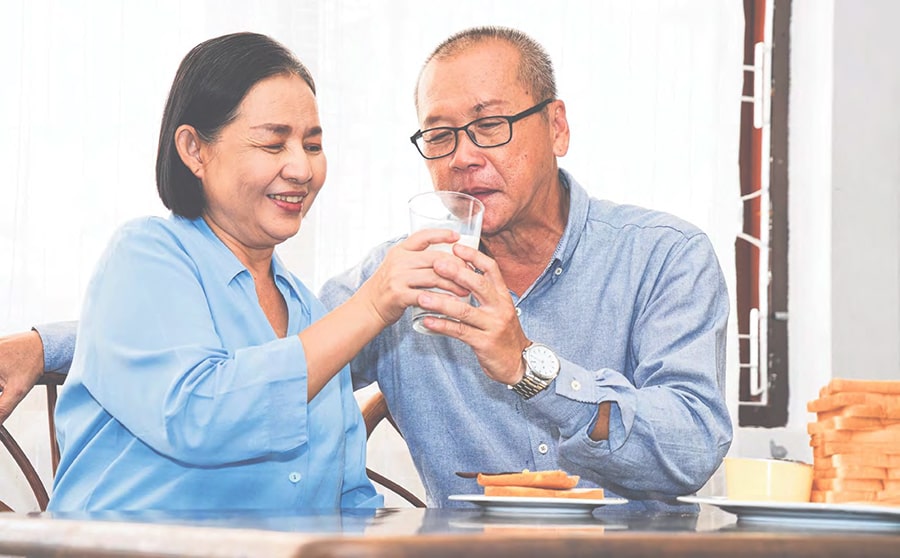 After a stroke, survivors and their caregivers need to relearn how to communicate their need for intimacy, say experts PHOTO: ISTOCKPHOTO
After a stroke, survivors and their caregivers need to relearn how to communicate their need for intimacy, say experts PHOTO: ISTOCKPHOTO
THE STRAITS TIMES (26 October 2022)
Beyond physical recovery, many survivors need help rebuilding emotional and physical intimacy with their partners
A stroke survivor in her 30s was too shy to ask what type of contraception she could now safely use. Another stroke survivor in her 70s felt rejected by her husband as he stopped hugging her.
Post-stroke rehabilitation here focuses on physical recovery, but many stroke survivors and their partners need help with renewing their emotional and physical intimacy as a couple. Yet they do not know how to ask for help, say experts working on this problem here.
Oct 29 is World Stroke Day, a time to raise awareness of the serious nature of strokes and what support is needed for survivors and their caregivers.
In Singapore, there were 8,846 incidences of stroke in 2020, according to the latest report from the Singapore Stroke Registry released in October 2022. Most stroke survivors are aged 60 and above, but the rate of incidence in younger age groups has increased since 2010.
Principal occupational therapist Shirlene Toh from Tan Tock Seng Hospital helped the stroke survivor in her 30s, who was advised not to use contraceptive pills by her doctor. Ms Toh introduced her to other birth control options.
“The first time I went to see her, she was rather emotional,” Ms Toh recalls. “She told me she was very grateful that there was someone with whom she could discuss her concerns. She didn’t know who to talk to and didn’t dare to ask the doctor.”
Ms Toh, an expert in the sexual health of persons with disabilities, adds that the inability to express one’s sexuality affects self-image, mental well-being and relationships.
For the couple in their 70s, she says: “When I told the husband that his wife missed his hugs and kisses, he was shocked and teared up. When the husband went up and hugged his wife, my patient was very happy, and it was the brightest smile I had ever seen on her face.”
Strokes happen when the flow of blood to the brain is restricted, or when a blood vessel ruptures.
Stroke survivors tend to deal with muscle weakness, cognitive issues and increased frailty.
Relationships with loved ones change. Spouses become caregivers and the existing distribution of household duties is affected. This takes a toll on intimacy as the focus becomes caregiving rather than a partnership or lover-like relationship.
Social taboos on discussing intimacy and sexuality leave people unsure of how to find help.
Family physician Angela Tan is a certified intimacy coach and cofounder of the private relationship counselling service, Academy of Relationship & Sex. In October 2022, she led a workshop on poststroke intimacy for Stroke Support Station (S3), a non-profit which supports the well-being of stroke survivors.
S3 has 300 members and 40 per cent of them are under the age of 60.
A 62-year-old woman who attended Dr Tan’s workshop at S3 and only wants to be known as Mrs A, was glad to find someone willing to talk about post-stroke changes in a relationship. Her 65-year-old husband had a stroke in 2021.
“It helped me accept that a onehanded hug while managing uncertain balance, and wonky kisses on the cheek are valid and enough to stay connected,” she says.
“It also helped me reflect that in our interaction now as a family, we spend more time together, laugh more, listen more and hear more spontaneous words of affirmation and affection than before the stroke,” she adds. “In many ways, we are closer than before.”
Regardless of age, says Dr Tan, couples want to keep their connection with each other going.
“The intimacy I encourage is not about intercourse but about how you have moments of connection when your partner seems so far away,” she says. Her clients relearn how to communicate their needs and work on different kinds of intimacy.
Physical intimacy can involve holding hands or giving back rubs and hugs. Dr Tan gives the example of a stroke survivor who preferred his wife’s help with bathing, saying that she acted out of love, while for the children, it was a duty.
Another couple in their 50s rekindled their romance – emotional intimacy – with the wife ordering flowers when her incapacitated husband wanted to gift them to her.
Rethinking their roles and goals as a couple can also help.
“It’s the connection that two people have that allows them to recharge and continue with the relationship,” says Dr Tan. “Love is hard work, it’s an ongoing process. It can’t happen spontaneously.”